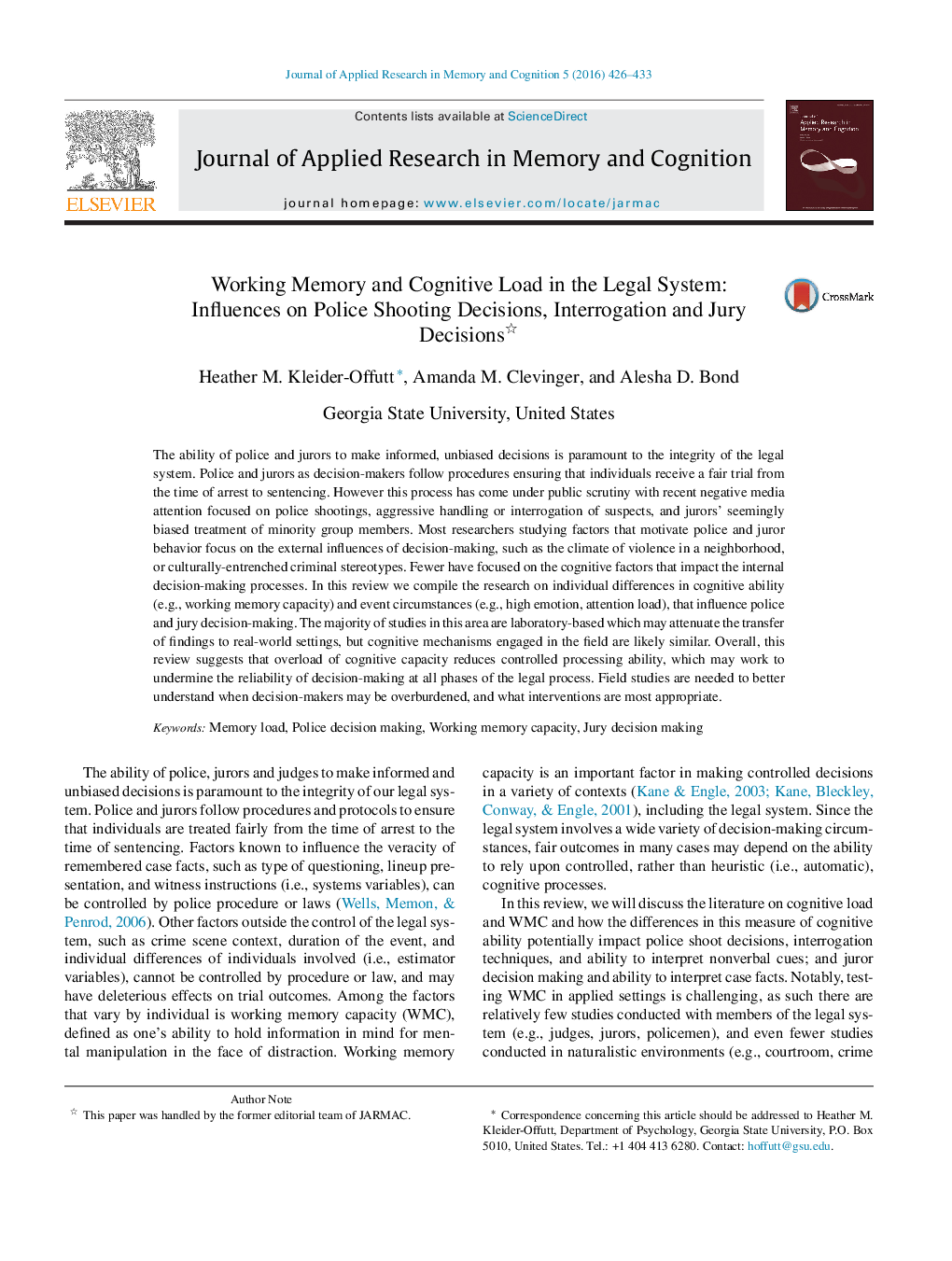| کد مقاله | کد نشریه | سال انتشار | مقاله انگلیسی | نسخه تمام متن |
|---|---|---|---|---|
| 5034070 | 1370052 | 2016 | 8 صفحه PDF | دانلود رایگان |
عنوان انگلیسی مقاله ISI
Working Memory and Cognitive Load in the Legal System: Influences on Police Shooting Decisions, Interrogation and Jury Decisions
ترجمه فارسی عنوان
حافظه کاری و بار شناختی در نظام حقوقی: تاثیر تصمیم گیری، تصمیم گیری و تصمیم گیری هیئت منصفه پلیس
دانلود مقاله + سفارش ترجمه
دانلود مقاله ISI انگلیسی
رایگان برای ایرانیان
کلمات کلیدی
بار حافظه، تصمیم گیری پلیس، ظرفیت حافظه کاری، تصمیم هیئت منصفه،
ترجمه چکیده
توانایی پلیس و اعضای هیئت منصفه برای تصمیم گیری های آگاهانه و بی طرفانه، به یکپارچگی نظام حقوقی اهمیت می دهد. پلیس و اعضای هیئت منصفه به عنوان تصمیم گیرندگان، پیگیری می کنند که اطمینان حاصل شود که افراد از زمان بازداشت تا محکومیت محاکمه عادلانه ای دریافت می کنند. با این حال، این روند تحت بررسی عمومی قرار گرفته است و توجه اخیر رسانه های منفی به تمرکز بر تیراندازی پلیس، دستکاری تهاجمی یا بازجویی مظنونان و رفتار اعتراضی اعضای گروه اقلیت با منافع اعضای هیأت منصفه است. اکثر محققین فاکتورهایی را بررسی می کنند که انگیزه رفتار پلیس و اعضای هیئت منصفه را بر تأثیرات خارجی تصمیم گیری، مانند آب و هوای خشونت در محله و یا کلیشه های جنایی مدنی فرهنگی متمرکز می کنند. کمتر بر عوامل شناختی که بر روند تصمیم گیری داخلی تأثیر می گذارند تمرکز کرده اند. در این بررسی، تحقیق درباره تفاوتهای فردی در توانایی شناختی (مثلا ظرفیت حافظه کاری) و شرایط رویداد (مثلا احساسات بالا، بارگیری توجه)، که بر تصمیم گیری پلیس و هیئت منصفه تاثیر می گذارد، کامپایل می کنیم. اکثریت مطالعات در این زمینه مبتنی بر آزمایشگاه هستند که ممکن است انتقال یافته ها را به تنظیمات دنیای واقعی کاهش دهد، اما مکانیزم های شناختی در این زمینه احتمالا یکسان هستند. به طور کلی، این بررسی نشان می دهد که بیش از حد از ظرفیت شناختی توانایی پردازش کنترل شده را کاهش می دهد که ممکن است برای اطمینان از تصمیم گیری در تمام مراحل فرایند قانونی تضعیف شود. مطالعات میدانی برای درک بهتر زمانی که تصمیم گیرندگان ممکن است بیش از حد محکوم شوند و برای مداخلات بیشتر مناسب باشند.
موضوعات مرتبط
علوم انسانی و اجتماعی
روانشناسی
روان شناسی کاربردی
چکیده انگلیسی
The ability of police and jurors to make informed, unbiased decisions is paramount to the integrity of the legal system. Police and jurors as decision-makers follow procedures ensuring that individuals receive a fair trial from the time of arrest to sentencing. However this process has come under public scrutiny with recent negative media attention focused on police shootings, aggressive handling or interrogation of suspects, and jurors' seemingly biased treatment of minority group members. Most researchers studying factors that motivate police and juror behavior focus on the external influences of decision-making, such as the climate of violence in a neighborhood, or culturally-entrenched criminal stereotypes. Fewer have focused on the cognitive factors that impact the internal decision-making processes. In this review we compile the research on individual differences in cognitive ability (e.g., working memory capacity) and event circumstances (e.g., high emotion, attention load), that influence police and jury decision-making. The majority of studies in this area are laboratory-based which may attenuate the transfer of findings to real-world settings, but cognitive mechanisms engaged in the field are likely similar. Overall, this review suggests that overload of cognitive capacity reduces controlled processing ability, which may work to undermine the reliability of decision-making at all phases of the legal process. Field studies are needed to better understand when decision-makers may be overburdened, and what interventions are most appropriate.
ناشر
Database: Elsevier - ScienceDirect (ساینس دایرکت)
Journal: Journal of Applied Research in Memory and Cognition - Volume 5, Issue 4, December 2016, Pages 426-433
Journal: Journal of Applied Research in Memory and Cognition - Volume 5, Issue 4, December 2016, Pages 426-433
نویسندگان
Heather M. Kleider-Offutt, Amanda M. Clevinger, Alesha D. Bond,
